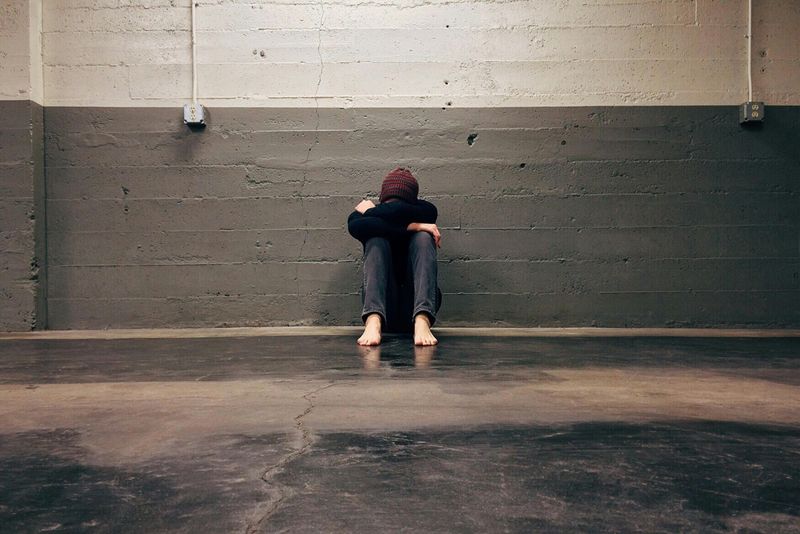Trauma doesn’t always announce itself with flashing neon signs. Sometimes it whispers through our everyday behaviors, affecting how we move through the world without us even realizing it. Past wounds can shape our reactions, relationships, and self-perception in subtle ways that feel completely normal to us. Recognizing these hidden signs is the first step toward healing.
1. You Apologize for Everything — Even Things That Aren’t Your Fault

The words “I’m sorry” tumble from your lips automatically – when someone bumps into you, when you ask for help, or even when you express a need.
This constant apologizing isn’t just politeness gone overboard. Your nervous system learned that taking blame quickly might prevent conflict or rejection. Perhaps as a child, apologizing became your shield against unpredictable reactions from others. Friends might tease you about your apology habit, but beneath this behavior lies a deeper story.
Your body remembers times when taking responsibility for everything felt safer than facing potential anger or abandonment. This protective mechanism served you once, but now it keeps you stuck in a pattern of unnecessary guilt.
2. You Struggle to Accept Compliments

Compliments make you squirm. When someone praises your work or appearance, you quickly brush it off, change the subject, or point out flaws they missed.
This isn’t mere modesty – it’s your trauma talking. Somewhere along the way, your brain formed a belief that being seen or valued might lead to danger. Maybe positive attention once came with strings attached, or perhaps achievement made you a target. The disconnect between how others see you and how you see yourself creates uncomfortable friction.
Your automatic deflection of praise serves as a protective barrier, keeping you safely invisible when compliments threaten to shine a spotlight on you. This shield protected you once but now blocks genuine connection.
3. You Feel Guilty When Resting or Doing Nothing

Rest feels like a forbidden luxury. Even during downtime, nagging thoughts creep in: “I should be productive right now” or “I don’t deserve this break.” Your body tenses when you try to relax, as if waiting for punishment.
This discomfort reveals how trauma rewired your understanding of safety and worth. Perhaps you learned that your value came from productivity, or that stillness left you vulnerable to criticism or danger. The constant need to be busy isn’t ambition – it’s hypervigilance wearing a productive mask.
Your nervous system believes that only through constant motion and achievement can you earn the right to exist. This exhausting belief system keeps you running on empty, afraid to pause even when your body desperately needs rest.
4. You’re a Chronic Over-Thinker

Mental gymnastics have become your specialty. Simple decisions spiral into elaborate risk assessments as your mind generates endless worst-case scenarios. This isn’t ordinary caution – it’s trauma’s attempt at control. Your brain learned that danger lurks around every corner.
By obsessively analyzing all possibilities, you unconsciously try to prevent history from repeating itself. The exhausting mental loops feel necessary for survival. Friends might wonder why choosing a restaurant becomes a complex operation for you.
What they don’t see is how your nervous system is working overtime, scanning for threats that once were real but now exist mainly in memory. This hypervigilance exhausts you but feels safer than the alternative: being caught unprepared again.
5. You Avoid Confrontation at All Costs

Disagreements make your heart race and palms sweat. You’ll agree with opinions you don’t share, take on extra work, or swallow your needs rather than risk creating waves. This peace-keeping isn’t just personality – it’s survival mode.
Your nervous system equates conflict with danger. Perhaps you grew up where disagreements escalated unpredictably, or where speaking up led to rejection or punishment. The fawning response became your safest option. While others see healthy debate as normal, your body interprets the slightest tension as a five-alarm fire.
The shape-shifting and people-pleasing exhaust you, yet the alternative feels impossibly threatening. This avoidance pattern keeps relationships superficial but predictable – exactly what your traumatized brain believes you need to survive.
6. You Over-Explain Yourself Constantly

Simple statements become detailed justifications. When you need a day off, set a boundary, or express a preference, you provide elaborate backstories and evidence. This isn’t just thoroughness – it’s your trauma speaking.
The compulsion to justify every choice reveals a deeper belief: that your needs alone aren’t valid enough. Perhaps your experiences were once dismissed, your boundaries violated, or your voice silenced. While you worry others think you’re rambling, you can’t shake the feeling that without perfect explanation, you’ll face rejection or disbelief.
This exhausting pattern reflects how you learned to be heard in environments where your truth wasn’t valued. The constant need to build an airtight case for your basic needs drains your energy and reinforces the belief that you’re inherently questionable.
7. You Feel Emotionally Numb or Detached

Life plays out like a movie you’re watching rather than experiencing. Important moments – celebrations, losses, achievements – feel strangely distant. This isn’t indifference – it’s your nervous system’s circuit breaker.
When emotions once overwhelmed your capacity to cope, your brain developed this protective shutdown. Like a house that dims its lights when too many appliances run at once, your emotional system learned to disconnect to prevent overload. People might misread your calm as coldness or lack of caring.
What they can’t see is how this numbness protected you when feelings were too dangerous or intense to process. This emotional dampening once saved you, but now it creates distance between you and the full spectrum of human experience, leaving you observing life rather than fully living it.
8. You’re Hyper-Independent

“I can handle it myself” isn’t just your catchphrase – it’s your life philosophy. Asking for help feels more threatening than exhaustion or failure. This fierce self-reliance masks a deeper wound. Your independence developed when depending on others proved painful or disappointing.
Perhaps caregivers were inconsistent, help came with strings attached, or vulnerability was exploited. Your brain concluded: better alone than betrayed.
Friends admire your strength without seeing its cost. The walls that protect you also isolate you, creating a lonely fortress where no one can hurt you – but no one can truly know you either. This adaptive response kept you safe when others couldn’t be trusted, but now prevents the very connection your heart secretly craves.
9. You Get Anxious When Someone Else Is Upset

Someone’s frown or sharp tone sends your system into high alert. Before they’ve said a word, you’re mentally reviewing what you might have done wrong and planning how to fix it. This isn’t mere empathy – it’s a trauma response.
Your nervous system learned to be a human emotional weather vane, detecting the slightest shifts in others’ moods as a matter of survival. Perhaps you grew up walking on eggshells around unpredictable emotions, where someone else’s bad day became your emergency.
While friends might notice your uncanny ability to sense moods, they don’t see how exhausting this hyperawareness is. Taking responsibility for others’ emotions once helped you navigate unsafe relationships. Now this pattern leaves you constantly scanning for emotional storms that aren’t yours to manage or prevent.
10. You Laugh Off Your Pain or Use Humor to Deflect

Cracking jokes during serious conversations has become your specialty. When topics get too personal or painful, humor creates a convenient escape hatch.
This isn’t just being the life of the party – it’s emotional armor. Somewhere along the way, you learned that raw vulnerability wasn’t safe. Perhaps expressing genuine feelings led to rejection, mockery, or being overwhelmed. The class clown persona protected your tender heart. Friends enjoy your witty comebacks without recognizing how carefully you guard your deeper truths.
The same humor that makes you the favorite at gatherings keeps people at a calculated distance. This deflection strategy brilliantly disguises pain as entertainment, allowing you to be seen while remaining fundamentally hidden.
11. You Stay in Relationships That Drain You

The red flags wave brightly, yet something keeps you anchored to relationships that take more than they give. This isn’t just poor judgment – it’s trauma’s familiar pull.
Your nervous system mistakes familiarity for safety. If early relationships taught you that love comes with criticism, neglect, or conditional approval, these patterns feel oddly comfortable. The unknown territory of healthy boundaries and genuine respect can feel more frightening than the pain you know.
Friends wonder why you tolerate mistreatment that seems obvious from the outside. What they can’t see is how your trauma rewired your definition of love and worth. The belief that you must earn affection through sacrifice or that real relationships require suffering keeps you trapped in cycles that confirm your deepest fears about your value.

Comments
Loading…